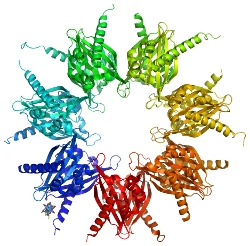Mike Hecht at Princeton has just published a quite interesting paper in PLoS One (linkurl:Fisher et al., 2011);http://www.plosone.org/article/info%3Adoi%2F10.1371%2Fjournal.pone.0015364 in which an expression library of completely random 'proteins' of 102 amino acids in length were shown to suppress a variety of deletion variants that otherwise inhibited cell growth. Most remarkably, four different deletion variants can be suppressed by the tandem expression of four selected, but otherwise random, proteins.
Now, there are various ways to view these results. One possibility is that the selected proteins replace the activities of the deleted proteins (i.e., classic suppression). This is the most interesting and also the most implausible result. Based on what we've learned from protein design studies, it would be truly remarkable if 102-amino-acid proteins drawn from a relatively small library of 106 different variations on a basic four helix bundle -- had even a fraction of the catalytic...
 |
linkurl:Andrew Ellington;http://f1000.com/thefaculty/member/409104261296178 is the Fraser Professor of Biochemistry at the University of Texas at Austin and an F1000 Member since 2001. This piece was adapted from linkurl:an entry on his blog,;http://ellingtonlab.org/blog/?p=335 where he writes about biodefense and synthetic biology, although not necessarily in that order.
Interested in reading more?
Become a Member of
Receive full access to more than 35 years of archives, as well as TS Digest, digital editions of The Scientist, feature stories, and much more!
Already a member?